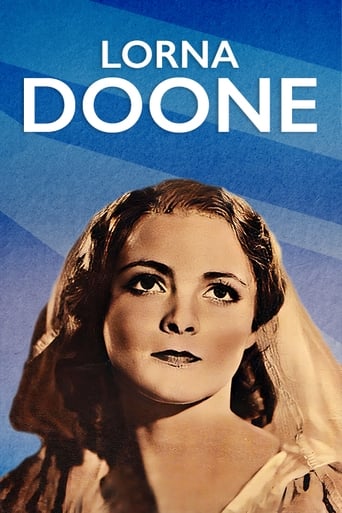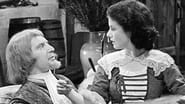MARIO GAUCI
I was not sure whether I should include two adaptations of the R.D. Blackmore classic (out of three I own) in the current Epic Easter marathon, but various factors decided in their favour. If anything, this British version is well regarded by both Leslie Halliwell and Leonard Maltin – unlike the 1951 U.S. remake but, then, I did already check out two works by the latter's director, Phil Karlson (and have a couple more vehicles lined up by its male star i.e. Richard Greene)…Anyway, I had been forewarned that the quality of the print for the title under review would be problematic but, while there was frequent shakiness to the image, it did not prove too distracting all things considered. Incidentally, the IMDb lists this among a number of films revolving around the figure of the English King Charles II – but James II is actually stated as being the royal at the time of the events (mid- to-late 1600s)! While the narrative was perhaps not terribly compelling (I do own a "Classics Illustrated" edition of it, dating from 1946, but I had long since forgotten its content!), the movie undeniably evokes the era being depicted through both pictorial (it was lauded for the outdoor location sequences) and aural (characters have a tendency here to burst into quaint singing, especially the titular heroine!) means. The plot deals with a boy farmer intent on avenging his father's death at the hands of bandits, but his life is saved one day near a waterfall by a girl member; when they grow up (he being played by John Loder and she by the unfamiliar Victoria Hopper) and he keeps seeing her – against his understandably disapproving mother's wishes – the two naturally fall in love! Opposition to their union, however, also comes from her camp – since she is coveted by leader Roy Emerton, in an impressive performance of ripe villainy that comes complete with diabolical cackle! His climactic come-uppance in the marshes at the hands of Loder constitutes the obvious highlight of the film, particularly in view of its abandoning natural sound and being accompanied solely by dramatic underscoring.Complementing the central romance (which has an agreeable "amour fou" element to it, down to Lorna's unlikely survival from a gunshot wound at her wedding ceremony by the jealous Emerton!) is a secondary one, ironically by actors still in the early phase of their career but who would rise far above what the nominal leads ever achieved, namely a debuting Margaret Lockwood and a young Roger Livesey (years before he became a Powell and Pressburger staple)!! Incidentally, the IMDb lists Jack Hawkins as having an undefined role here but I certainly did not spot him! If there is a failing to the film, it is in the fact that the revelation of Lorna being blue-blooded after all (that is, she had been kidnapped by the Doones as a child and raised as one of their own vilified kind) does not quite carry the impact it certainly ought to have!
Igenlode Wordsmith
I was hoping this would be a better version than the 1950s "Lorna Doone", which was memorably described as having been directed "like a Western" and which I remember as basically a cut-price Ivanhoe/Robin Hood clone.But with names like Roger Livesey and Miles Malleson involved, this 1930s production really ought to have been better. Alas, it set my teeth on edge in the first scenes -- featuring some unconvincing child actors -- and somehow didn't seem to improve; I never found myself caring much about the fate of the characters, and by the time we got to the immense and prolonged assault by the villagers on the Doone valley (apparently including large numbers of women waving flaming torches) I was actively resenting it. I'm not quite sure why.Carver Doone is annoying, with his ho-ho-I'm-a-villain laugh, and Victoria Hopper's Lorna is sweet but unmemorable. Towering John Ridd is a bit of a clodhopper, which I suppose makes sense but makes the character hard to identify with as the hero. The Doones' backstory is largely lost, so that we don't get a sense of the honest commoners versus the gentlemen gone to the bad; in fact, there's very little hint that these Doones were ever noble at all. The script, with the exception of a few acid asides, really doesn't seem to show the Malleson touch, and while a lot of money has clearly gone into the sets and staging it felt self-consciously 'period' rather than being a natural setting for the characters. The local accents (especially those of John and Annie Ridd) come and go in a way that is more distracting than if the yokels simply spoke the King's English like everybody else -- couldn't somebody have kept an eye on vocal continuity? -- and the whole thing just didn't involve me the way it should. I got off to a bad start and never really recovered.It's only fair to say, however, that the film does contain some adventurous and striking visual compositions, in particular in the various night battle sequences of the second half. Effective camera angles and bold lighting effects produce a memorable effect; it's just a pity that this didn't contribute more to the overall success of the production.The "Lorna Doone" that I would recommend to date is the TV adaptation of 2000, about which great fuss was made at the time over the authenticity of the longhorned cattle, etc; I couldn't answer for that, but what it does have is a vivid set of characters and an absorbing version of the story, which this one seems to lack. I came in with great expectations of the 1934 version, which came highly recommended, and ended up totally unengaged by it.
Snow Leopard
This version of "Lorna Doone" is a good and straightforward adaptation of R.D. Blackmore's classic novel. It is an old-fashioned story of drama, romance, and adventure, set in a wild English countryside in the 1600's.The Doones are a notorious gang of outlaws, who have long been terrorizing the area with no fear of the law. Lorna is a young girl who has been brought up by these villains, and who falls in love with honest, brave John Ridd, whose own father had been killed by the Doones. Many complications ensue as John tries to win Lorna over the opposition of Carver Doone, the most dangerous of the wicked clan, and as Lorna's own past threatens her relationship with John. There is both romance and action as everything unfolds.The cast, mostly English character actors, is unspectacular but good. (And watch for Margaret Lockwood in one of her earliest appearances, in a smaller role as Annie Ridd.) The period touches are convincing, although they do make for a very quaint feel. The scenery nicely brings out the Devonshire setting, and adds to the action.This is a movie that anyone who likes these old-fashioned stories should enjoy.




